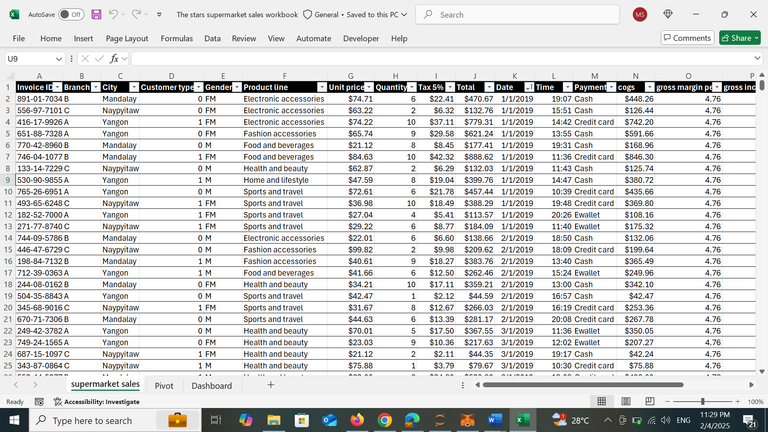The business started over ten years ago. It wasn’t really booming in the first few years, but after I joined the firm, we worked out an excellent social media marketing strategy using storytelling to first create a massive awareness about the brand and then sold to people.

The sales didn’t meet up what we envisaged in the first year, and the boss was all worried, but patience they say, sells more than desperation. He talked about using some price competition or so which I kicked against. Why? That’s because I believe that you don’t have to run at loss because you want to sell your products. Rather, you can only choose to reduce your profit margin.
That said, the year after I joined, the little followers (leads) we attracted in the first year started to convert to actual buyers and that was the beginning of the sales generation for the firm.
The company got so busy that we had to start employing more hands to aid the business growth and make sure our customers weren’t lacking in any way. We prioritized customer satisfaction and retainment while we also tried to attract new ones.
In a short time, the company made quite some money and it was able to fund some of their pending projects.
2 years later when the business boomed, I asked the boss important questions.
- How much sales have the company made over the years?
- How much profit has the company recorded?
- Who are the top customers?
- Where are the top customers located?
- Does the company pay tax at all? If yes, how much have we paid? Do we have the record?
- What expenses does the company make recurrently?
- How many staff has worked with the company over the years and how many of the staff stayed the longest?
- Are there any surveys asking the staff to air their opinions about the work culture and how much they’re pleased working in the company?
And so much more…

Now, to all these questions, the boss had no answer and that is because there was no structure in place for proper data generation for the company to make important business decisions.
Asking questions about the sales and profit of the company will help the company know the worth, compare it with the efforts, and see what they do better. My boss used to have a target amount of money to be generated annually, but without this data, there’s no way to know if the company actually meets up or not.
Important marketing decisions also are results of proper data collection. Thank God for some social media metrics, else that data too wouldn’t have been found anywhere.
Knowing your most valuable customers will help you appreciate them which will encourage them to do more than patronize you. They will further refer you to other people that you may not even have met on a normal day.
Happy employees equals a productive work environment. Staff satisfaction data is one way that will help the company ensure that they are on the right track, and that the company meets its objectives.
The role that data plays in businesses cannot be undermined. If you’ve not been taking the art of data collection in your business seriously, this is a queue to work on it.
And you don’t need an expensive tool for that. Using google forms (for surveys and data collection), sheets, and excel (for organizing and analyzing data) are very helpful tools to make this a success.
Images are my analysis from an open data from kaggle.
Spanish translate was done using google translate.
El negocio comenzó hace más de diez años. No estuvo realmente en auge en los primeros años, pero después de unirme a la empresa, elaboramos una excelente estrategia de marketing en redes sociales utilizando la narración para crear primero un conocimiento masivo sobre la marca y luego venderla a la gente.

Las ventas no alcanzaron lo que habíamos previsto durante el primer año y el jefe estaba muy preocupado, pero dicen que la paciencia vende más que la desesperación. Habló de utilizar alguna competencia de precios o algo así, algo que yo combatí. ¿Por qué? Eso es porque creo que no tienes que correr con pérdidas porque quieres vender tus productos. Más bien, sólo puede optar por reducir su margen de beneficio.
Dicho esto, el año después de que me uní, los pequeños seguidores (clientes potenciales) que atrajimos en el primer año comenzaron a convertirse en compradores reales y ese fue el comienzo de la generación de ventas para la empresa.
La empresa estaba tan ocupada que tuvimos que empezar a emplear más manos para ayudar al crecimiento del negocio y asegurarnos de que a nuestros clientes no les faltara nada. Priorizamos la satisfacción y retención del cliente mientras también intentábamos atraer otros nuevos.
En poco tiempo, la empresa ganó bastante dinero y pudo financiar algunos de sus proyectos pendientes.
Dos años después, cuando el negocio floreció, le hice preguntas importantes al jefe.
- ¿Cuántas ventas ha realizado la empresa a lo largo de los años?
- ¿Cuánta ganancia ha registrado la empresa?
- ¿Quiénes son los principales clientes?
- ¿Dónde se encuentran los principales clientes?
- ¿La empresa paga algún impuesto? En caso afirmativo, ¿cuánto hemos pagado? ¿Tenemos el registro?
- ¿Qué gastos realiza la empresa de forma recurrente?
- ¿Cuánto personal ha trabajado con la empresa a lo largo de los años y cuántos del personal permanecieron más tiempo?
- ¿Existen encuestas que pidan al personal que exprese sus opiniones sobre la cultura laboral y cuánto les complace trabajar en la empresa?
Y mucho más…

Ahora, a todas estas preguntas, el jefe no tenía respuesta y eso se debe a que no existía una estructura para la generación adecuada de datos para que la empresa tomara decisiones comerciales importantes.
Hacer preguntas sobre las ventas y las ganancias de la empresa ayudará a la empresa a conocer el valor, compararlo con los esfuerzos y ver qué hacen mejor. Mi jefe solía tener una cantidad objetivo de dinero que se generaría anualmente, pero sin estos datos, no hay forma de saber si la empresa realmente cumple o no.
Las decisiones de marketing importantes también son el resultado de una recopilación de datos adecuada. Gracias a Dios por algunas métricas de las redes sociales; de lo contrario, esos datos tampoco se habrían encontrado en ninguna parte.
Conocer a sus clientes más valiosos le ayudará a apreciarlos, lo que los animará a hacer más que ser condescendiente con usted. Además, lo derivarán a otras personas que quizás ni siquiera haya conocido en un día normal.
Empleados felices equivalen a un ambiente de trabajo productivo. Los datos de satisfacción del personal son una forma que ayudará a la empresa a garantizar que van por el camino correcto y que la empresa cumple con sus objetivos.
No se puede socavar el papel que desempeñan los datos en las empresas. Si no se ha tomado en serio el arte de la recopilación de datos en su negocio, esta es una cola para trabajar en ello.
Y no necesitas una herramienta costosa para eso. El uso de formularios de Google (para encuestas y recopilación de datos), hojas y Excel (para organizar y analizar datos) son herramientas muy útiles para que esto sea un éxito.
Las imágenes son mi análisis de datos abiertos de kaggle.
Posted Using INLEO
